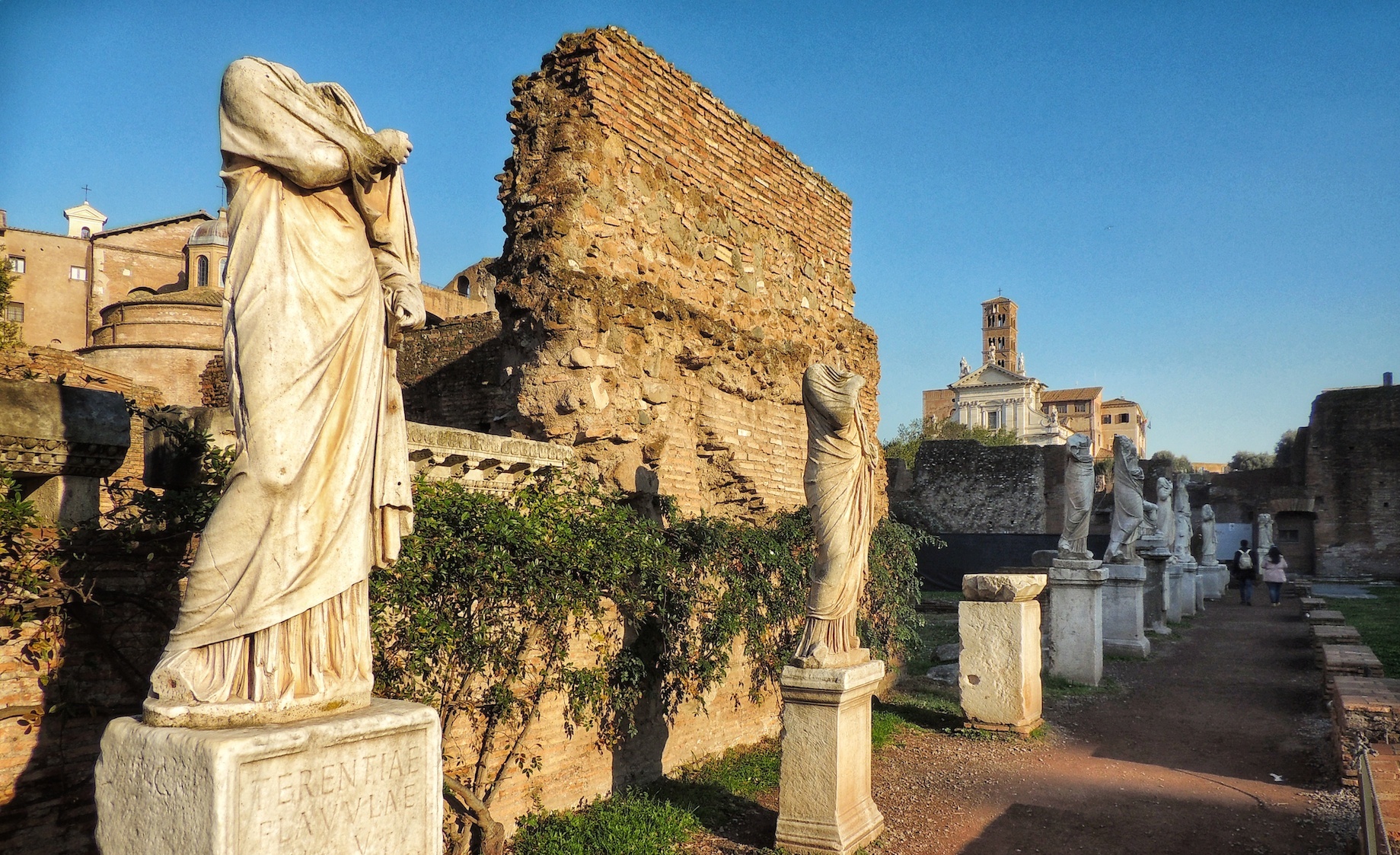The Roman Forum is a labyrinth of ruins – crumbling columns and walls overgrown with weeds and wildflowers. Once the centre of public life in Rome, with its courthouses, temples, and even venues for gladiatorial combat, now all that remains are some evocative fragments.
One of the better-preserved temples is the Temple of Vesta, at the eastern edge of the Forum. Vesta, the Roman goddess of the home, was one of the most important deities in Ancient Rome, but it is her priests, the Vestal Virgins, who have captured the imaginations of subsequent generations. Our guide will show you their house and temple, so you can learn all about the lives of the Vestal Virgins our Private Colosseum Tour with Ancient Rome.
These women led extraordinary lives, utterly different from those of their contemporaries. At the age of only six or seven, they were selected for the priesthood and sworn to celibacy for thirty years. As children they would have had little understanding of the enormous commitment they were making, beginning a life of extreme contrasts and contradictions that could end in comfortable retirement or cruelly premature death.
Vestal virgins were chosen from highborn families and were granted privileges that would have been unimaginable for other women in Ancient Rome. They could own property, vote, and write a will. They had the best seats at public games, and they even had the power to free condemned prisoners and slaves. A condemned man on his way to his execution only had to catch a glimpse of a Vestal Virgin to be freed. For an in-depth exploration of the role these extraordinary women played in ancient society, check out our Women of Rome virtual tour.
But despite the powers and privileges granted to the Vestal Virgins, they were still living in a patriarchal society that controlled all aspects of their lives. As priestesses their main task was to guard the sacred flame in the Temple of Vesta, keeping the fire alight. Letting the flame go out led to bad luck for Rome, and worse luck for the responsible priestess, who would be stripped and beaten by the chief priest as punishment.
As their name suggests, virginity was integral to their identity. While extramarital sex was frowned upon in Rome, those who indulged in it usually faced a fate no worse than confiscation of property. For the Vestal Virgins, however, it was a much more serious matter. They were considered daughters of the state, and having sexual relations with anyone was tantamount to treason.
The original punishment for sexual transgression was allegedly whipping or stoning to death the guilty party, but an even crueller punishment was later devised by Tarquinius Priscus, the fifth king of Rome. No one was allowed to spill the blood of a Vestal Virgin, so to solve this problem, it was decided that a guilty Vestal Virgin should be buried alive. However, this led to another problem, as technically no burials were allowed within the city of Rome. The solution? Give the condemned woman enough food to keep her alive for a few days so that her grave could be called “a room”. In this way, the Vestal Virgin was not buried alive but was simply sent to a room with some provisions, where she would die a natural death.
The grim procession to this “room” is described in a nineteenth-century book, A School Dictionary of Greek and Roman Antiquities:
When condemned by the college of pontifices, she was stripped of her vittae and other badges of office, was scourged, was attired like a corpse, placed in a close litter, and borne through the forum attended by her weeping kindred, with all the ceremonies of a real funeral, to a rising ground called the Campus Sceleratus, just within the city walls, close to the Colline gate.
There a small vault underground had been previously prepared, containing a couch, a lamp, and a table with a little food. The pontifex maximus, having lifted up his hands to heaven and uttered a secret prayer, opened the litter, led forth the culprit, and placing her on the steps of the ladder which gave access to the subterranean cell, delivered her over to the common executioner and his assistants, who conducted her down, drew up the ladder, and having filled the pit with earth until the surface was level with the surrounding ground, left her to perish deprived of all the tributes of respect usually paid to the spirits of the departed.
This extraordinarily sadistic punishment is reported to have been carried out only on a few occasions, and there were also a couple of lucky escapes. The Vestal Virgin Tuccia was accused of having breached her vow of chastity, but she proved her innocence by carrying water in a sieve. This apparent miracle saved her life. Another Vestal Virgin named Postumia was put on trial merely because of the way she dressed, and the fact that she liked to make jokes. According to Livy, this suspicious behaviour led to a warning from the chief priest “to stop making jokes and to dress in future with more regard to sanctity and less to elegance”.
The Vestal Virgins who survived their thirty years of service were rewarded with a comfortable pension and permission to marry, but most women chose not to. They remained respected members of society until their deaths, well-off and reasonably independent regardless of their relationship status.
The famous House of the Vestals in the Roman Forum may no longer be as grand and opulent as it was in Ancient Rome, reduced to ruins and a row of statues, but one advantage is that it’s now open to the public. Many of the temples and buildings in the Forum would have only been accessible to the privileged few, and there’s something rather poignant about the fact that two thousand years of history have opened the doors – and the walls – to the rest of Rome.
Our Ancient Rome tours reveal more secrets of the House of the Vestal Virgins. You don’t have to commit to thirty years of chastity to walk through its hallways, but with our experts, you will feel as though you’ve been transported back in time, to the age of emperors, gladiators and Vestals.














